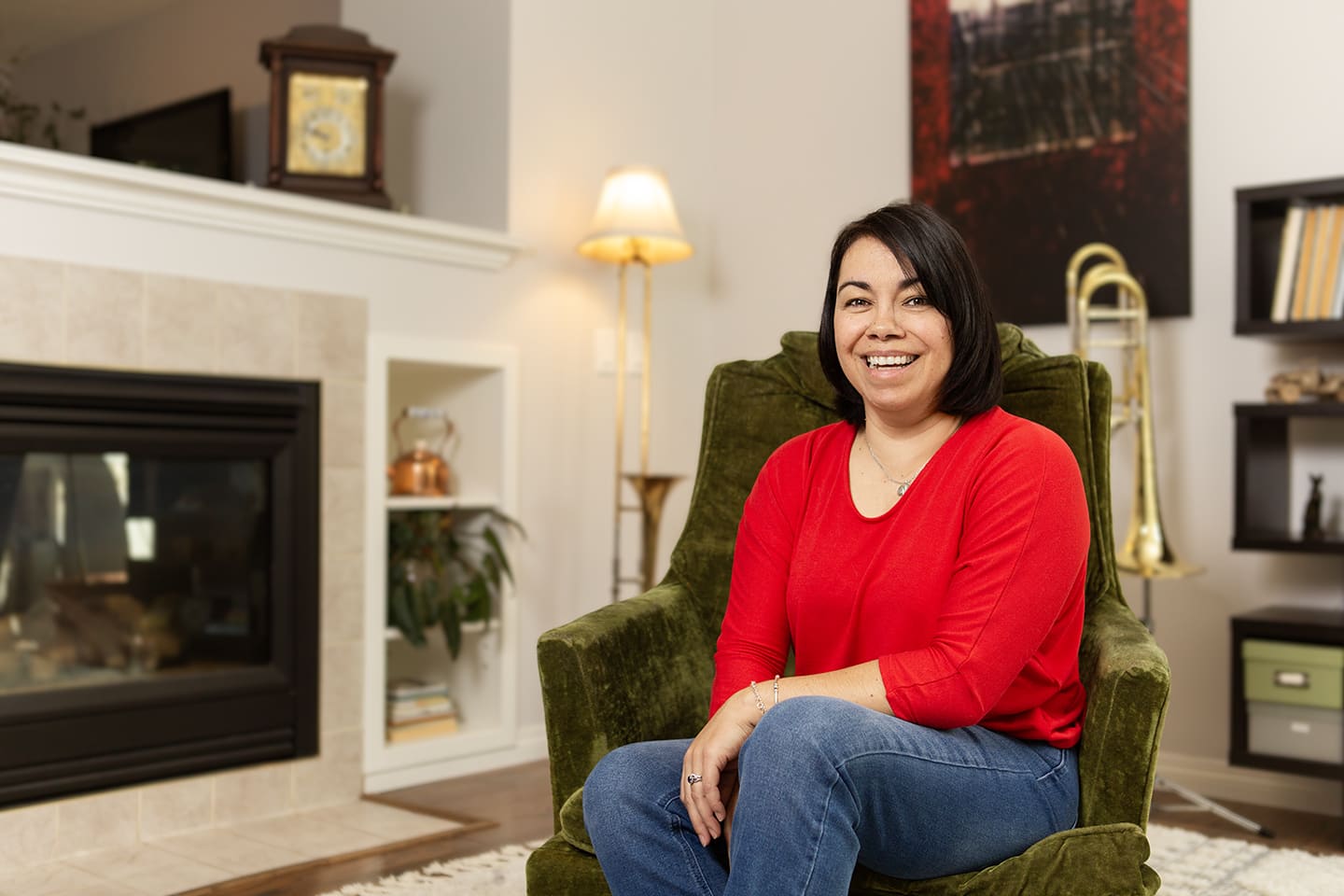Empowering Canadians with IBD: Inspiring Resilience
Life Beyond Diagnosis: Empowering Canadians with IBD to Live in the Moment
This story features a real patient sharing their personal experience in their own words. Individual experiences may vary. This information is available to the general public for disease awareness only; it should not be used for diagnosing or treating a disease. Please consult your health care provider for advice.
This story is prepared by Takeda and Carla, Matthew and Jennifer received compensation from Takeda for their participation.
Takeda’s Living in the Moment campaign offers a powerful testament to life beyond an inflammatory bowel disease (IBD) diagnosis. Inspired by the acclaimed European initiative, this Canadian adaptation uses photography to showcase strength, resilience, and hope—empowering individuals living with Crohn’s Disease (CD) and Ulcerative Colitis (UC) to see themselves beyond their condition.
Through three inspiring Canadian stories, the campaign highlights how timely intervention, personalized care, and unwavering support can transform lives. Each story reveals the power of living fully—whether pursuing passions like music and sports, connecting with community, or advocating to break the stigma around IBD.
The Living in the Moment campaign underscores that IBD is not a roadblock but part of a larger journey. By sharing stories of courage and creativity, it reminds patients they are not alone and can embrace life with dignity, pride, and optimism.
Meet Carla

Carla’s journey with ulcerative colitis (UC) began in her early twenties, while living alone far from her family in Chile. At first, the symptoms were frightening and isolating—constant urgency, blood in her stool, and no clear answers. "Even drinking tea would trigger me," she recalls. Over five months, she visited doctor after doctor, but no one could explain what was happening.
Eventually, Carla moved back to her mother’s house. With her support, Carla finally received a diagnosis: ulcerative colitis. But the consultation left her feeling adrift. "I was told I’d be on medication for the rest of my life, with little explanation of what that meant." It was a crushing moment for someone just beginning adulthood.
Still, Carla pushed forward. She moved to Canada, built a blended family with her husband and their three teenagers, and embraced life as a proud "dance mom," cheering on her daughter’s dreams. But behind the scenes, she continued to struggle with flares, setbacks, and treatment hurdles.
Things began to change when Carla sought out additional support — not just medically, but emotionally. Participating in the PaCER program at the University of Calgary connected her with others living with IBD and opened her eyes to a different kind of healing. “I heard so many stories,” she says. “People just diagnosed, people who’d been struggling for years, and that's when I realized I needed to empower myself to advocate for my own care.”
Building on that sense of empowerment, Carla made her mental health a priority. Therapy, self-advocacy, and a renewed outlook all became part of her path forward. Earlier this year, she finally received confirmation: her test results were normal. For the first time, she felt like she had genuinely reclaimed her life. "Looking at that test result, seeing it was normal, it was everything," she says. "I proved to myself, to my husband, to my family, that healing is about more than medication."
“Today life is so good. I see no problems around me, just blessings.
The difference in her life has been extraordinary. Two years ago, she struggled even to attend her daughter’s dance competitions, often missing performances because she had to stay near a bathroom. "I used to pack extra clothes, wear diapers. I missed so many moments," she says. "Now, I can sit through an entire show and be fully present."
Carla and her husband have even begun travelling again, a simple joy that once felt impossible. "It is a huge change," she says. "The anxiety is gone. I can just live in the moment."
Through it all, Carla emphasizes how vital support is on the journey. "You need someone beside you. Someone to hold your hand and say, ‘We can do this together.’ That makes all the difference."
Today, she approaches life with a renewed sense of gratitude and resilience. "I am here. I am alive. I have no issues,” she says. “That is a blessing."
Meet Matthew

Matthew was diagnosed with Crohn’s disease before he turned three. Though he was too young to remember life without the condition, his early experiences shaped how he learned to adapt and move forward. “Crohn’s has always been part of my life,” he says, “but I’ve never let it define me.”
Managing Crohn’s has not always been easy, with Matthew facing ongoing challenges, including a serious flare-up in high school that cut a family ski trip short and required emergency care. “When your health is poor, it becomes your only concern,” he recalls. “But once you have it under control, it opens the door to everything else.”
As he got older, Matthew learned to manage his Crohn’s and found joy through the things he loved most – hockey and music. “With my condition being stable, I am able to live a healthy and active lifestyle,” he says. While he eventually stepped away from competitive sports, his passion for piano only grew stronger. That path led him to McGill University’s Schulich School of Music, where he is now completing a master’s degree in jazz piano performance and composition.
Matthew also channels his experiences into advocacy. In high school, he and his family organized a series of benefit concerts in support of the Gutsy Walk, bringing his hometown community together through music. “Every year the audience grew… and the music got better too,” he says. “I’m really proud of the concerts that we put on.”
“Knowing you’re not alone is powerful. There are people who understand what you’re going through, and that makes a difference.
Today, Matthew continues to raise awareness as a volunteer with Crohn’s and Colitis Canada, having served as honorary chair for both the Ottawa-Gatineau and National Gutsy Walks. Sharing his story has become a way to support others navigating similar journeys. “Because I talk openly about Crohn’s, people know they can come to me. It’s important to share.”
Matthew’s life is full. He balances his studies, live performances, teaching piano students, and spending time with friends. Crohn’s has never been the end of the story. It is part of his life, but not the definition of it. As he says, "I have a very good life. It could have been a lot worse for me, so I am thankful for that.”
Meet Jennifer

Jennifer was just nine years old when she was diagnosed with Crohn’s disease. The signs were subtle at first: she stopped eating, began losing weight, and at one point, had a green bowel movement. Her mother, alarmed, brought her to their family doctor, who quickly referred her to CHU Sainte-Justine in Montreal.
That was the beginning of a new reality. There were colonoscopies, endoscopies, bloodwork, and the dreaded barium tests that became all too familiar. “It felt like you never had time off.”
From that point on, hospitals became routine. There were constant follow-ups and frequent reminders that she was different. “My entire life has been impacted by Crohn’s disease,” Jennifer says. “I don’t really have memories from before.”
In school, she did her best to keep her diagnosis invisible. After surgery, she avoided the locker room and changed in the shower stalls to hide her scars. She remembers feeling isolated, unable to explain why her body looked different. But at home, her parents stood firmly beside her, her mother present at every appointment, her father sleeping beside her in the hospital. “They were really 100 percent there to support me,” she recalls. “I was lucky to have good parents who could be there.”
As she got older, Jennifer found some control in what she ate. Fruits, vegetables, foods meant to nourish, were often the most harmful. She kept a mental list of safe meals, adapting year by year to a shrinking menu.
That strategy worked, until a cancer diagnosis forced her to stop her Crohn’s medication altogether. After finishing treatment, she hesitated to begin a new regimen, afraid it might worsen her condition or cause additional complications. “I was afraid to start new medication, I delayed it as long as I could,” she says. But the delay proved costly. Her Crohn’s flared severely, leading to two emergency hospitalizations and ultimately, a third surgery.
“It was like a reset,” she says of that operation. “Since then, things are 200 percent better.” For the first time in decades, she could eat without fear. Peaches, pears, carrots, once triggers, returned to her plate. “Seeing colour on my plate still makes me happy,” she says. “Even now, I get excited.”
“I know people can live very normal lives with this illness. That gives me hope.
That renewed sense of balance extends beyond the kitchen. Jennifer now works in environmental restoration, helping reintroduce nature to farmland. Spending time outdoors has become part of her rhythm – biking and bouldering with her partner, or walking through fields for work. “It gives me strength,” she says. “Physically, emotionally, it’s all connected.”
The illness hasn’t disappeared. She still monitors her health closely, and the fear of relapse lingers. But perspective has shifted.
In turn, Jennifer has since become an advocate for others. As a volunteer with the Gutsy Walk committee at Crohn’s and Colitis Canada, she helps raise awareness, speaks at events, and mentors newly diagnosed patients. Talking about the disease was what helped her finally move out of denial. “It made things lighter,” she says.
Now, years into her journey, the part she’s most proud of isn’t just surviving. It’s choosing to share. “I’ve been through a lot, and I’m still here,” she said. “I know what I’ve lived, and I want to use that to help someone else.”
